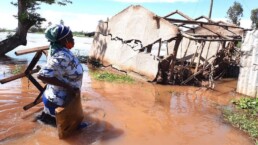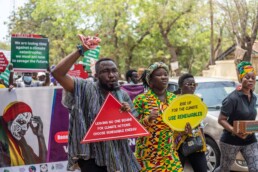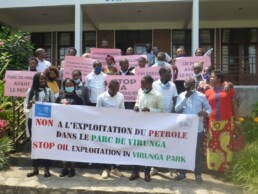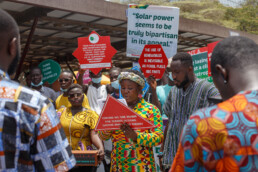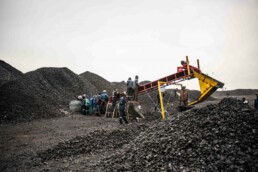COP28 Takes Historic Step in Addressing Climate Loss and Damage: A Call for Accountability in Africa
In a groundbreaking move at COP28 in Dubai, the international community has taken a significant step towards addressing the profound impacts of climate change on vulnerable communities. The adoption and operationalization of the Loss and Damage (L&D) fund mark a critical milestone in recognizing the urgent need for financial support in regions disproportionately affected by the climate crisis.
Understanding Loss and Damage
We’ve all once heard a story of a family or community losing their lands, crops, homes and loved ones due to the impacts of climate change. Some of those stories tell about heavy rainfalls, coastal erosion, or desertification causing loss and damage. In the climate space, the concept of Loss and Damage acknowledges that some climate change impacts are beyond the scope of adaptation, leading to irreversible losses for communities. From extreme weather events to slow-onset impacts like rising sea levels, vulnerable regions, particularly in Africa, bear the brunt of these consequences. Communities are grappling with economic losses, displacement, and the inability to rebuild in the aftermath of devastating climate events.
Operationalizing the Fund: Hope for Africa
Africa, a continent facing the severe consequences of climate change, stands to benefit significantly from the operationalization of the Loss and Damage fund. The COP28 decision signals a commitment to providing financial assistance and support for African nations grappling with the escalating impacts of climate change. This includes measures to address both immediate and long-term losses, enabling communities to rebuild and adapt to a changing climate.
“The step towards operationalizing the Loss and Damage fund is a promising start to the climate talks. The urgency of the climate crisis requires that we move with speed to translate this to action and work towards the delivery of financing to communities that continue to bear the brunt of the climate crisis in the most climate-vulnerable regions. It is time for big polluters in line with their historic emissions to pay up to deliver justice to those disproportionately affected by their reliance on fossil fuels” says Landry Ninteretse, Director of 350Africa.org
The Call for Accountability
While 350Africa.org appreciates the establishment of the fund, it is concerning that wealthy nations have swiftly attempted to downplay its significance by proposing inadequate contribution thresholds. The requirements of affected communities amount to hundreds of billions, not mere millions. This should be seen as just the beginning, and there is an urgent need for substantial increases in pledges to address the magnitude of the issue.
The international community has taken a commendable step in addressing Loss and Damage yet, but there remains a critical aspect of accountability that must not be overlooked. Big polluters and fossil fuel companies, historically responsible for a significant share of greenhouse gas emissions, are called upon to participate in the Loss and Damage fund.
This is not merely a financial contribution; it's a recognition of the need to rectify the historical injustice imposed on vulnerable communities.
As COP28 unfolds in Dubai, the global community must seize the opportunity to set a precedent for corporate responsibility in the face of the climate crisis. The Loss and Damage fund, when supported by major polluters and fossil fuel companies, can become a powerful tool for redressing climate-related injustices and supporting the resilience of communities in Africa and beyond. The world is watching, and the decisions made in Dubai will echo for generations to come. It's time for all stakeholders, including corporate giants, to step up and take responsibility for healing our planet and ensuring a sustainable future for all.
COP28: A Pivotal Moment for Climate Action and Renewable Energy Advocacy
With COP28 happening in Dubai, the urgency to address the escalating climate crisis has never been more palpable. In this pivotal moment, 350.org is at the forefront, urging global leaders to embrace a binding energy package that not only sets ambitious goals but also charts a course for a comprehensive and just transition to renewable energy.
Setting the Stage for a Transformative Energy Package:
The discourse put forth by 350.org calls for a paradigm shift at COP28, one that involves committing to a robust and binding energy package. At the heart of this proposal are ambitious targets:
- Tripling Renewable Energy Capacity: The call to triple fair, safe, and clean renewable energy capacity by 2030, with a subsequent deployment of 1.5 terawatts per year, marks a watershed moment in our commitment to combating climate change.
- Doubling Energy Efficiency: Recognizing the intrinsic link between efficiency and sustainability, the proposal to double energy efficiency by 2030 represents a pivotal step towards optimizing communities’ access to affordable and clean energy.
- Phasing Out Fossil Fuels: The unequivocal call for a complete phase-out of fossil fuels by 2050 signals a paradigm shift in our energy paradigm, emphasizing a commitment to a sustainable future.
The Urgency of a Global Renewable Energy Target:
As climate experts warn that 2023 could be the hottest year on record, the significance of adhering to the 1.5°C global heating limit cannot be overstated. 350.org emphasizes that a global renewable energy target is not merely symbolic; it is a practical necessity. However, the success of such a target hinges on its swift implementation at a global scale, coupled with a commitment to equity. A mere proclamation will not suffice – tangible actions are imperative.
Navigating Financial Barriers to a Sustainable Future:
Andreas Sieber, 350.org's Associate Director of Global Policy, brings to light the financial complexities that have long hindered the transition to renewable energy, especially in the Global South. Sieber proposes a multi-faceted approach, including debt cancellation, significant concessional finance, and grants to the tune of $200 billion per year. This financial backing is not charity but an essential investment in a just, equitable and sustainable future.
“A renewable energy target at COP28 will only constitute a meaningful step towards climate justice if it is accompanied by a clear roadmap for implementation that includes equitable mechanisms and commitments in the financial and policy realms, as well as an urgent and equitable phase-out of fossil fuels. Without these, any agreement would represent a hollow, ‘easy win’, and risk allowing polluting countries to hide behind a renewables goal while continuing to emit fossil fuels.” Andreas Sieber, 350.org's Associate Director of Global Policy
May Boeve, Executive Director of 350.org, underscores the concept of climate justice, asserting that a global renewable energy target should be coupled with commitments to finance a just transition. This involves acknowledging the historical disparities and ensuring that the transition away from fossil fuels is both rapid and equitable.
“COP28 presents an opportunity for a long overdue course correction: a global renewable energy target, poised for adoption, is a crucial step towards limiting global heating to below 1.5 degrees. However, it must come with commitments to finance the just transition in the Global South and a rapid, equitable phase out of fossil fuels. 350.org is at COP28 to ensure climate justice is centered in the negotiations, and working with movement partners on the ground, to ensure the voices of those most impacted by the climate crisis take center stage.” May Boeve, Executive Director of 350.org
Voices from the Frontlines:
In a poignant addition to the narrative, Landry Ninteretse, Regional Director of 350Africa.org, highlights the voices of communities directly impacted by the climate crisis. For these communities, a shift to renewable energy is not a distant goal but an immediate necessity. Ninteretse's call for wealthier nations to expedite their commitment to scaling up renewable energy investments and supporting the tripling of renewable energy capacity by 2030 amplifies the urgency of the situation.
“For communities on the frontlines of the climate crisis, an equitable global shift away from fossil fuels to safe and sustainable renewable energy is an absolute necessity, as they have felt the catastrophic climate impacts for decades. At COP 28, we expect leaders to commit to significantly scaling up investment in renewable energy and supporting plans for the tripling of renewable energy capacity by 2030, while prioritizing the phase-out of fossil fuels. Wealthy nations must respond with the scale and urgency that matches the escalating climate crisis by delivering on a clear plan for climate adaptation finance, loss and damage and enhancing the support for African countries to undertake nationally determined just transition pathways.”
Ensuring the success of COP28's proposed energy package requires a multi-faceted approach. Additionally, the organization stresses the importance of relying solely on proven renewable energy technologies, such as wind and solar, to guarantee the effectiveness of the proposed measures.
The Journey to Achieving 10% Renewables in Ghana’s energy mix in 2030: RE4CC in the Frontline
Ghana is embracing a renewable energy revolution that is poised to transform the nation's energy landscape. With a resolute commitment to achieving 10% renewable energy in its power generation mix, Ghana is charting a course toward a sustainable and prosperous future. At the forefront of this ambitious endeavor is the Renewable Energy for Communities Coalition (RE4CC), a dynamic alliance of civil societies dedicated to driving Ghana's transition to clean, reliable, and affordable energy sources.
In this article, we embark on an investigative journey of Ghana's renewable energy sector. From the challenges of energy access to the legal framework supporting renewable energy and the grassroots community engagement spearheaded by RE4CC, we delve into the stories that illuminate Ghana's path toward a greener and brighter tomorrow.
The situation of energy access in Ghana
The situation of energy access in Ghana is a tale of two realities. While the urban areas of the country boast relatively high rates of electricity access, with over 87% of the population having reliable power, the story takes a different turn when we venture into rural communities. In these remote areas, nearly half of the population still lacks access to electricity, leaving them in the shadows of energy poverty.
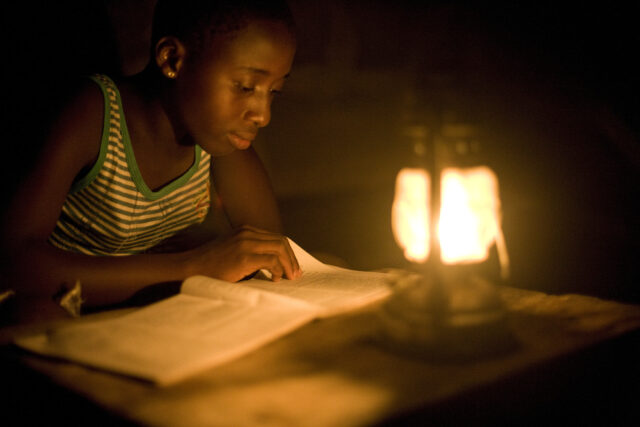
This glaring disparity in energy access poses significant challenges to the development and well-being of rural communities. Without electricity, schools struggle to provide quality education, healthcare facilities are limited in their capabilities, and economic opportunities remain constrained. Basic daily tasks become burdensome, with households relying on traditional and inefficient sources of energy such as kerosene lamps and woods for cooking.
The lack of energy access not only hinders the progress of individuals and communities but also perpetuates inequalities and widens the gap between urban and rural areas. It is a pressing issue that calls for urgent action to bridge the energy divide and provide equal opportunities for all Ghanaians.
Recognizing the critical importance of energy access for socio-economic development, the Ghanaian government, along with various stakeholders, is spearheading initiatives to expand electricity coverage to rural communities. The goal is to ensure that every Ghanaian, regardless of their location, has access to reliable and affordable electricity.
One of the strategies employed is the expansion of the national power grid, extending its reach to previously underserved areas. This involves infrastructure development, including constructing transmission lines, substations, and distribution networks. Through these efforts, the government aims to connect rural communities to the main grid, providing them with a reliable source of electricity.
However, extending the power grid to remote areas can be challenging due to geographical constraints, logistical complexities, and high costs. In some cases, it may not be feasible or cost-effective to rely solely on grid extension. Therefore, alternative approaches are being explored, with a particular emphasis on decentralized and off-grid solutions.
Renewable energy technologies, such as solar power and small-scale hydroelectric systems, are playing a crucial role in bridging the energy access gap in Ghana.
The legal framework of RE in Ghana
To bridge that gap, Ghana has made significant strides in establishing a robust legal framework to promote and support the development of renewable energy. Recognizing the importance of renewable energy in achieving sustainable development goals and reducing reliance on fossil fuels, the government has enacted several laws and regulations to provide a conducive environment for renewable energy investments and operations.
The cornerstone of Ghana's legal framework for renewable energy is the Renewable Energy Act of 2011 (Act 832). This legislation serves as the primary law governing the development, management, utilization, and supply of renewable energy for power generation and other related purposes. The Renewable Energy Act aims to create an enabling environment that attracts investments in the renewable energy sector, supports renewable energy projects, and promotes the use of renewable energy technologies.
However, despite this law, in 2018, the percentage of renewable energy in the energy mix remained less than 2%. This objective of generating 10% of renewable energy in the national energy mix was then pushed back to 2030. While Ghana's legal framework for renewable energy is comprehensive, challenges and gaps still exist.
Power up Ghana with RE
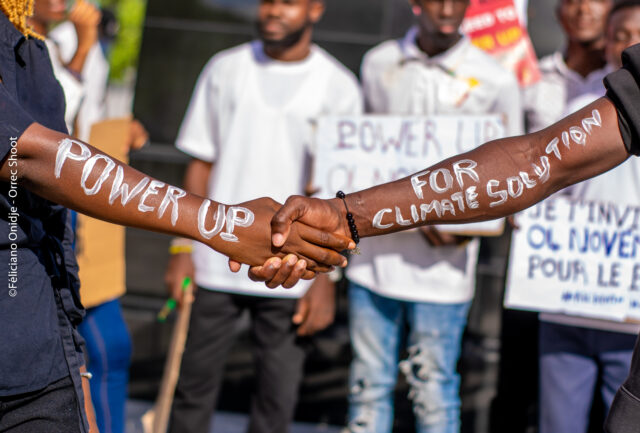
Access to reliable and affordable electricity remains a pressing challenge in Ghana. While significant progress has been made, millions of Ghanaians still lack access to this essential resource. The lack of energy access hampers socio-economic development limits educational opportunities, and restricts productivity.
Renewable energy emerges as a game-changer, capable of propelling Ghana's progress and bridging the energy access gap. Blessed with abundant solar, wind, hydro, and biomass resources, the nation stands at the precipice of a renewable energy revolution that promises to reduce reliance on fossil fuels and extend the transformative power of electricity to even the remotest corners.
Solar energy, with its unlimited potential, is illuminating previously dark corners of the country. Remote communities, schools, and healthcare centers are embracing solar power, enabling access to education, healthcare, and economic opportunities. Hydroelectric power, a long-standing pillar of Ghana's energy infrastructure, continues to play a vital role, leveraging the nation's water resources to generate clean and reliable electricity. The fusion of traditional and emerging renewable energy sources sets the stage for a diverse and resilient energy mix.
RE4CC in the frontline
The RE4CC (Renewable Energy for Communities Coalition) is at the forefront of Ghana's renewable energy revolution. This coalition brings together various stakeholders, including civil society organizations, community leaders, and renewable energy experts, with a common goal of accelerating the deployment of renewable energy solutions across the country.
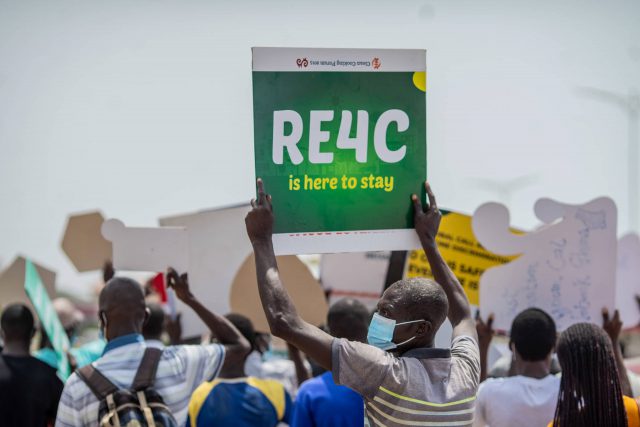
RE4CC acts as a catalyst for change, advocating for policies that promote renewable energy, raising awareness about the benefits of clean energy, and promoting community-centered renewable energy projects such as Renewable Energy for Schools, and Renewable Energy for Communities.
Launched after the victory to stop the construction of the 700 MW coal-powered station in Ekumfi Regional and Central region of Ghana, the campaign tries to get the Ghanaian government to commit to investing in renewable energy as a solution to Ghana’s energy challenges. The campaign also runs awareness-raising actions on the benefits of renewable energy getting guidance from the Renewable Energy Act of Ghana and manifestos from the presidential election. Indeed, great work on influencing and lobbying has been done so far. In 2017, one of the leading CSO of the RE4C coalition reviewed the RE Act making their input and suggestions back to parliament under the REact initiative.
As Ghanaians, things have to be spicy sometimes. In 2022, the coalition organized a procession in which they used the launch of the IPCC solutions and adaptation report to call for implementing the RE Act plans to ensure Ghana minimizes its NDCs and that the government commits to its promise of more renewable energy in the energy mix. They walked on the street to educate the public on the release of the IPCC report on solutions and adaptation and why it’s important for Ghana to choose Renewable Energy and provide Solutions.
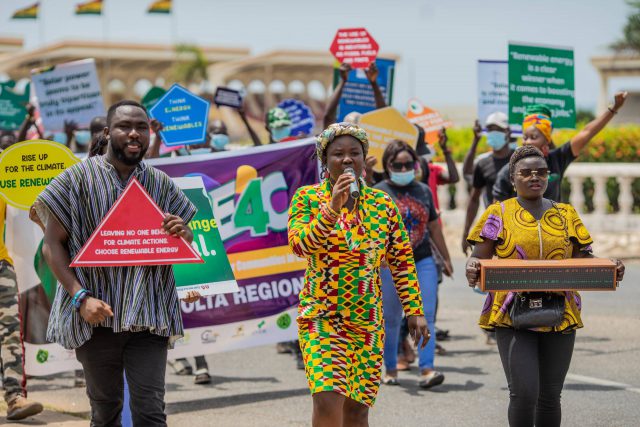
By fostering collaboration and knowledge-sharing, the RE4C coalition is empowering communities to take ownership of their energy future and actively participate in the transition to a sustainable and resilient energy system.
Communities at the center:
Rural women play a key role in supporting their households and communities in achieving food and nutrition security, generating income, and improving rural livelihoods and the overall well-being of the family and community. In July 2022, the RE4C team visited Apam in the central region of Kukurantumi in the eastern region of Ghana to train women and girls on the impacts of climate change and the need to champion the use of renewable energy in their districts.
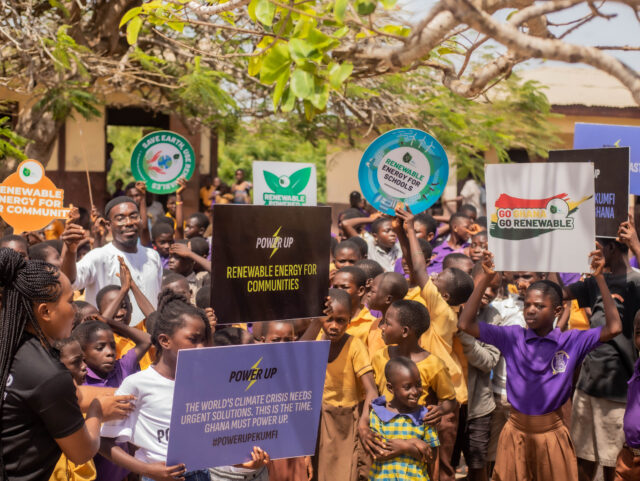
While education is the key to human capital development, in some remote areas, school-going children still lack access to electricity to learn at night. That situation prompted the implementation of the Solar for School project in St Louis senior high school in the Ashanti region to on one hand distribute solar kits and on the other, educate students on climate change, renewable energy, as well as the need for them to take the lead and become renewable energy agents of change that can drive the coalition’s vision of a 100% Renewables in Ghana.
Through training, exhibition, processions, advocacy, and policy review, the RE4C team created a platform for women and young people to become Renewable Energy Champions to enhance the achievement of 10% Renewable energy in Ghana’s energy mix in 2030.
#AfrikaVukaNews: New year and re-energized in our pursuit for climate justice
As we leap into the month of February we hope that this last month, since we started the new year, has been good to you and that you are still staying safe and healthy.
We continuously acknowledge that many communities across the world are still experiencing the adverse effects of climate change and are working hard to rebuild what has been lost. We stand in solidarity with them and hope that this year, the AfrikaVuka Newsletter will continue to inspire more people in the world to stand up to the fossil fuel industry to build a sustainable future.
AfrikaVuka believes in unity and with this new year, this new chapter, the words of the late Archbishop Desmond Tutu continues to echo in our hearts, saying:
“We are made for goodness. We are made for love. We are made for friendliness. We are made for togetherness. We are made for all of the beautiful things that you and I know. We are made to tell the world that there are no outsiders. All are welcome: black, white, red, yellow, rich, poor, educated, not educated, male, female, gay, straight, all, all, all. We all belong to this family, this human family, God's family.”
In Case You Missed It
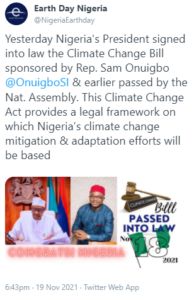
Nigeria Climate Bill: On Thursday, 18 November 2021, Nigeria’s President Muhammad Buhari signed into law the climate change bill passed by the national assembly. This comes after the country's announcement of working towards a 2060 net-zero target at the COP26 climate talks in Glasgow.
Nigeria now joins an elite group of countries that have enacted emissions-target legislation aiming to curb carbon emissions. The new climate change law is significant in many ways as it sends a strong positive message to the world that Nigeria understands the enormity and urgency of resolving the current climate crisis.
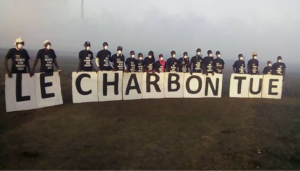
San Pedro coal-fired power plant: Communities of San Pedro, Côte d'Ivoire, local and global environmental civil society, have been fighting for years for the cancellation of the controversial San Pedro coal-fired power plant project. These communities are now demanding an official statement from the government to confirm if the Ivorian government is serious about abandoning the project. The announcement to abandon the project was reportedly made on November 18th by the Minister of the Environment and Sustainable Development speaking to parliamentarians during the budget session.
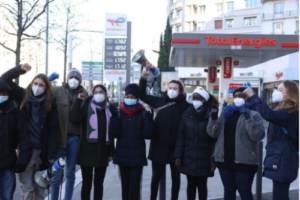
#StopEACOP: The #StopEACOP (East African Crude Oil Pipeline) Campaign started the year with a bang with activists from Uganda and Tanzania crossing the oceans to France on a quest to denounce the involvement of the French oil giant, TotalEnergies, in the EACOP project and its related activities. In a ceremony meant to celebrate the city of Grenoble as Europe’s Green Capital, activists called out the irony of the award when the most ecologically destructive project is organized in the same country. The activists protested at various TotalEnergies gas stations and organized street marches as well as challenged the leaders of the country to take action and stop the EACOP project.
You can continue to show your support by writing to the banks most likely to consider financing the pipeline. Together we can #StopEACOP and create a just and sustainable economic future.
One to Watch
2022 - Hope Needs Action
As we review 2021, we cannot help but be amazed at some of the epic wins, and very insightful learnings on events and campaigns that are important to stopping the climate crisis. Through these, we will continue to raise our voices and stand against climate justice.
A breath of Fresh Air as Coal Free Nigeria Campaigners meets Legislators
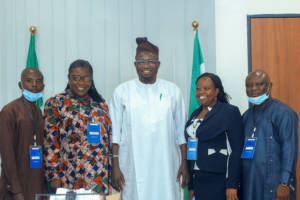
Coal Free Nigeria campaigners from Benue State, Kogi State, Kaduna State, Nasarawa State and the Federal Capital Territory received a breath of fresh air in their bid to get the government of Nigeria to stop the issuance of coal mining licenses. This fresh air came with resounding hope as the activists met with legislators representing communities that are already grappling with the adverse effects of coal mining at the recently held National Climate Lobby Day.
The National Lobby Day commenced on Monday the 25th of October, 2021 with the training of coal campaigners on the act of lobbying by David Michael Terungwa. The campaigners were taken through the 5-levers of building political will and through a demonstration of a mock lobbying exercise the advocates shown the act of lobbying. Thereafter, campaigners practiced in different groups how they were going to engage the legislators on Coal Free Nigeria demands.
Consequently, On the bright and sparkling morning of Tuesday, 26th October, 2021, the team approached the National assembly complex with twisted feelings of excitement and trepidation with uncertainty of how events will pan out. After a few hitches at the entrance of the complex, the team proceeded to capture this historical moment in still pictures. Thereafter, one after the other, 5 different groups went in search of their designated Senator or House of Representative member.
After about 3 hours of scanning for the offices of their designated legislators, the group returned with bursting euphoria of the feat they just achieved. The community member from Benue State successfully got in touch with their representative, Honourable Patrick Ejeh. He welcomed the team with great enthusiasm and he expressed his oblivion of the coal mining activities taking place in Ogbadibo Local Government Area of Benue State. He requested for documentation of the team findings on the activities of coal miners in the area, unfortunately, the team from Benue did not have one at the time. They however, assured the Honourable of presenting him their findings by their next visit.
On the other hand, their counterparts from Kogi were unable to meet Honourable Zakari Alfa who represents Ankpa LGA, but were able to secure a rescheduled date for the meeting. Furthermore, other campaigners met the Senate Committee Chairman on Ecology and Climate Change, Senator Mohammad Gusau who received them warmly. He solicited that the campaigners engage the Nigerian team at the COP 26 in Glasgow.
In retrospect, the first National Climate Lobby Day presents light at the end of the tunnel for the Coal Free Nigeria campaign.
BY Joseph Ibrahim
EACOP-AFFECTED COMMUNITIES TRAINED IN MEDIA USE
Community-Based Monitors (CBMs) from six Ugandan districts have been trained on how to use the media. The trained monitors were drawn from six of the ten Ugandan districts through which the East African Crude Oil Pipeline (EACOP) will pass.
The monitors were trained during a September 21, 2021 workshop that was organised by Africa Institute for Energy Governance (AFIEGO). At the training, the monitors were taught how to do the following: identify newsworthy stories, pitch their story ideas to editors, operate as citizen journalists who capture their communities’ stories and share them with the media, write op-eds and others.
WHO ARE THE COMMUNITY-BASED MONITORS?
The Community Based Monitors are community leaders who observe and report on the human rights situation of the 3,045 households whose land is being compulsorily acquired for the EACOP project in Uganda.
The Community Based Monitors were trained not only because they have knowledge of the challenges their communities face but because they are also literate. With their reading, writing and oratory capabilities, they can ably use the media to tell their communities’ stories.
While the above is true, prior to the training, the Community Based Monitors lacked media engagement skills. This limited their capacity to use the media to tell their communities’ stories. This undermined community advocacy efforts to protect community rights.
WHY EACOP COMMUNITIES NEED TO USE THE MEDIA
The EACOP, a planned 1,443km pipeline, has a big environmental footprint. According to the World Wide Fund for Nature (WWF), the pipeline will affect nearly 2,000 sq. km of protected wildlife habitat. Endangered species such as chimpanzees, elephants and others have been put at risk because of the EACOP project.
Lake Victoria, the second biggest freshwater lake in the world on which up to 40 million people in East Africa depend, is also set to be affected by the EACOP. Further, the pipeline has presented climate change concerns with up to 34.3 million metric tonnes of carbon per year expected to be produced when the oil transported by the EACOP is used.
Ugandans, majority of whom are employed in the agricultural sector, depend on good climate as well as healthy ecosystems to make a living. The EACOP is therefore a threat to their livelihoods.
DISRUPTION OF LAND-BASED LIVELIHOODS
Moreover, already, the EACOP has disrupted the livelihoods of the 3,045 households whose land is being compulsorily acquired for the project.
Through cut-off dates that were set in 2019, the 3,045 EACOP-affected households were stopped from using their land to grow perennial food and cash crops. The people were also stopped from setting up any new developments. Food stress and loss in incomes have resulted as a result of the above. Women and girls have borne the brunt of the above impacts.
MEDIA AND HUMAN RIGHTS PROTECTION
The media plays a critical role in protecting the rights of people. To empower the EACOP-affected people to tell their own stories through the powerful media, the September 21, 2021 media training for the Community Based Monitors was organised.
FRUITS OF TRAINING
Since their training, the CBMs have written op-eds that have been published over five times in the national press. Some of the published op-eds may be seen here and here (see article 2).
With AFIEGO and our partners’ support, the CBMs have also used their citizen journalism and other skills to engage the media to demand for fair compensation. Through the media engagements, the people’s demands have been published in over eight national and sub-national media outlets. Some of the published stories may be seen here or here or here or here. The media stories create the pressure needed to protect communities’ rights.
The communities need to be further supported to engage the media to protect our shared climate, the environment and their livelihoods.
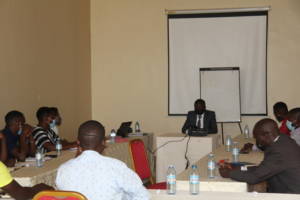
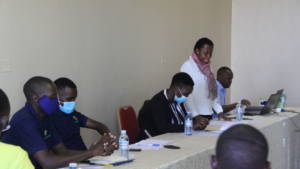
Abuja Hotspot for a Global Just Recovery
The just-concluded Global Just Recovery Gathering was a delightful online conference that brought together individuals from all over the world. Participants at the Abuja hotspot hosted on Friday, 9th April 2021 expressed their delight at the outcome of the gathering. The “hotspots”, also held in a number of other countries across Africa, allowed families, friends and colleagues to physically gather together to watch and participate in the virtual sessions that had been organised as part of the gathering.
From the movement story on why we need a new multilateralism for a global just recovery, to the workshop on UNFCCC COP, participants learned from the wealth of experience of the speakers and enhanced their understanding of the climate movement and how everyone's effort is critical in actualising a just recovery world.

One of the participants expressed his agreement on the issues of global financing discussed by Masego Madzwamuse and other speakers on the subject of multilateralism for a just recovery.
In conclusion, the hotspot event which lasted for four hours was a success as participants got the opportunities to listen to global speakers on current issues and also to appreciate various cultural practices from across the globe.
A big part of a just recovery is bridging the gap and building on equity. By hosting this hotspot event we ensured that those without internet access were able to join this community. Notwithstanding the Covid19 prevention protocols in place, existing members of our movement interacted with the newbies and together made commitments towards a #CoalFreeNigeria at the Global Just Recovery Gathering. To support our movement do check out the #CoalFreeNigeria page and take action with us.
By Ogho Udoko Agnes
Nigeria Joins the rest of the world to demand for a Just Recovery
On Friday the 19th of March, 2021 Non-Governmental Organisations, Civil Society Organisations and environmental enthusiasts across Nigeria performed various public actions reechoing their demands for the Government of Nigeria to stop issuing coal mining licenses. These actions took place in seven locations viz Abuja, Abia, Benue, Kano, Kaduna, Lagos, and Port Harcourt.
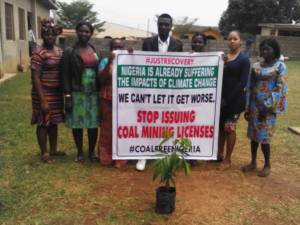
Campaigners across the country visited different government offices (Federal Ministry of Environment, Abuja, State Ministry of Environment, Benue, and the National Environmental Standards and Regulations Enforcement Agency, Kaduna), with a clear message to the Nigerian Government to stop the issuance of coal mining licenses. The message was accompanied with a beautiful plant which reinforced the foundation of a non-violent approach to the Coal Free Nigeria Campaign.
The action was in solidarity with climate campaigners across the world who took to the street to demand for JUST RECOVERY on the Global Climate Strike day. Consequently, the action increased the impetus of the Coal Free Nigeria Campaign as more local communities joined to demand for climate justice.
On the other side, feedbacks and content generated from the local action were shared on social media in order to increase awareness and amplify the voices of the frontline communities.
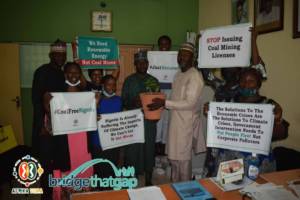
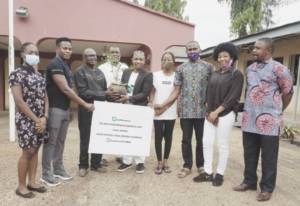
Furthermore, the action was able to secure more signatories to the online petition that is asking the Nigerian Government to stop the issuance of coal mining licenses so as to make it easy for our country to usher in a just transition from fossil fuel dependence and more so, ensure we are playing a great role in minimising the rapidness of climate change.
By; Joseph Ibrahim, Ogho Udoko and Francis Ebhodaghe


